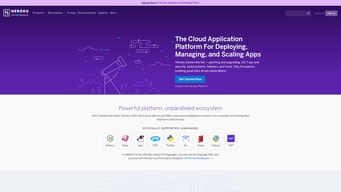

Unclaimed: Are are working at Salesforce Heroku ?
Salesforce Heroku Reviews & Product Details
Salesforce Heroku is a cloud platform as a service (PaaS) that enables developers to build, run, and scale applications in various programming languages and frameworks in the cloud. It simplifies the deployment process, auto-manages the infrastructure, and provides integrated data services, making it easier for developers to focus on writing code without worrying about the underlying hardware or software layers. Heroku supports a wide range of development languages, including Ruby, Java, Node.js, Python, and PHP, offering a highly flexible environment for application development and deployment.
| Company | Salesforce |
|---|---|
| Year founded | 1999 |
| Company size | 10,001+ employees |
| Headquarters | San Francisco, California |
| Social Media |

| Capabilities |
API
CLI
|
|---|---|
| Segment |
Small Business
Enterprise
|
| Deployment | Cloud / SaaS / Web-Based |
| Training | Documentation |
| Languages | English |


Compare Salesforce Heroku with other popular tools in the same category.

Heroku's tight integration with the Salesforce platform allows developers to easily deploy and manage their custom apps alongside their CRM data. This reduces the need for complex integrations and simplifies development workflows.
I like everything, the addon provides everything I need.
Salesforce Heroku simplifies building and deploying custom applications on top of the Salesforce platform. It avoids the complexities of managing infrastructure, setting up servers, and maintaining security, allowing developers to focus on application logic and user experience.
Salesforce Heroku is a PaaS platform that I have grown to appreciate. It stands out for its simplicity in setting up, deploying code, and overall management. In contrast to AWS, GCP, or Azure, where the onus is on me to configure and oversee everything, Heroku streamlines the process. As a software developer with limited devOps experience, Heroku has become my preferred tool for managing server infrastructure.
It is expensive and has many paid add-ons.
I use it to deploy the backend services of my applications. I currently have more than 10 web services running on Salesforce Heroku
I have been using Heroku for deploying one of the new venture products for english language tutoring. The thing I like about Heroku is that it can support many languages at the same time. It uses Ubuntu in the underlying OS which makes installing packages quite easy. We haven't needed to use customer support as of now because the documentation of Heroku is helpful and it solves most of issues. It is easily handling our 7 million user base and more than 50 thousand test takers quite easily. It is easily integrable wih all packages. We are using it daily for our development.
I don't like that it doesn't have enough analytics for the SQL database hosted on its server. It becomes difficult to do job query optimisation when we are making the calls on the database
Heroku is the primary software we use for deploying our main application. It's API is lightweight which makes it super-easy for our team of developers to deploy the fix and changes on the main branch. It also supports a perfectly useful database for postgres setup which can be optmised to the number of users we need.
Developer experience with security makes it a winning combination
Nothing as such to dislike about the product
We were able to acheive more with the data we had !! Its simplifies security and compliance
Simply database and deployment for my services
Changes happen without notice that require quick adjustments
Easy to use for non-technical and technical users
Ease of use and scalibilty with all the application
A bit expensive if you are planning to run an app on a long term basis
Developing applications on Heroku. This is helping the client save on the infra cost.
It allow us to easily build,deploy and deploy web applications using a wide range of programming language and tools. It also provides a highly scalable and flexible environment for building and deploying web applications
The cost can be a significant drawback for some business when using it
It helps to solve the problems of deploying and scaling web applications and also benfiting my business by streamlining development and reducing infrastructure management overhead
Easy to use, GUI is intuitive and also heroku provides their own CLI to perform all functions related to your web application. Pipelines are a great feature that greatly improves new integrations. It is a thru CI solution
Nothing to dislike so far, we have been using heroku for several months now and so far we haven't had issues with it. We use it do host our thirdparty integration with our ERP using APIs
Third-party API integration with our ERP, we are using web services to accomplish this. also, heroku add-ons are a great feature; for example we have postgreSQL addon
Most of all, it is fast and straight to the point. The best thing about Heroku is not having to go trough the hassle of creating a server, hiring an URL, managing proxies, authentication, etc.
Until 2022 it was possible to test an entire site by simply cloning the code into your Github and syncing to Heroku, but at the end of 2022 the free database attached to the Heroku free accounts were removed, not allowing for even lightweight processing for test, requiring a paid plan for any kind of operation requiring a database.
Heroku was very helpful in testing an MVP and showing it to the company's partners in a very economical and fast-paced fashion. It was somewhat easy to configure the server instance to run a Django website.
With Heroku we can quickly scale our solutions when the demands come, with practically zero downtime. Besides, it's straightforward to attach new services and create multiple environments for testing and development.
The biggest con about Heroku is the price model of some addons, which are not directly related to Heroku itself, in some cases we can see common services like DB hosting costing 2 or 3 times more than in other environments.
Heoku help us scale our solution with ease. Besides scaling, it also supporting cloning, so we can easily extend our services to our customers when necessary either by increasing our main service capacity or by creating a dedicated environment for that customer.




